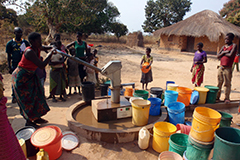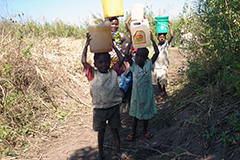Interview with Research Fellow Taguchi Shimpei: How Empirical Research Leads to New Discoveries
2021.11.08
The JICA Ogata Sadako Research Institute for Peace and Development (JICA Ogata Research Institute) is currently working on a project called "Empirical Research in Africa," which carries out secondary analyses of data collected from various JICA projects. As part of this research, Research Fellow Taguchi Shimpei analyzed the data from the Project for Groundwater Development in Luapula Province Phase 2 in Zambia and summarized findings in research papers with his fellow researchers. We sat down with Taguchi to discuss about the significance of empirical research.

—Tell us about the overview of the research.
"Empirical Research in Africa" re-analyzes data obtained from JICA’s past works and covers a broad range of projects that the organization has aided so far. We analyzed the data from one such initiative, a grant aid project called the Project for Groundwater Development in Luapula Province Phase 2, conducted by JICA in Zambia from 2012 to 2013. The project constructed 216 borehole water supply facilities with handpumps to provide safe drinking water. Boreholes in Zambia are traditionally dug by hand, so they are shallow and the water is not always clean, often containing pathogenic bacteria such as E. coli. To address these issues and improve the rate of supplying safe and clean water, JICA aided the construction of borehole water supply facilities.
The questionnaire was administered to both treatment and control groups and asked what sort of changes occurred in households before and after the water supplies were constructed. We analyzed this data in detail and showed how the construction of borehole water supply facilities affected local households. Specifically, we looked at the following areas and summarized our findings in research papers: 1) the effect on children, 2) the effect on adults, 3) the effect on handwashing behavior, 4) differences of the effect on biological children versus adopted children, and 5) economic value.
—What new discoveries did you make through this empirical research?
First, let’s look at 1) the effect on children. The success story that would naturally come to mind is that the construction of borehole water supply facilities would eliminate the need for children to spend time traveling long distances to get water. They would be able to use that time to go to school instead. However, the empirical research showed a different reality. For girls living within 100 meters of a water supply facility, the burden of fetching water actually increased because access to clean water gave rise to more water-related housework demands, such as cooking and laundry. Moreover, school attendance among children didn’t rise. In terms of diarrhea, the data didn’t show an improvement among school-age children, but the frequency of diarrhea among pre-school children dropped by 5% points.

A borehole water supply facility was constructed by JICA in Luapula Province in Zambia (Photo: JICA)
In terms of 2) the effect on adults, the frequency of contracting diarrhea also dropped, which reduced the number of days they couldn’t work. However, that didn’t mean they worked more days. Instead, the data shows that this increased leisure time. This reveals that in Zambia’s agricultural villages, a decrease in diarrhea cases doesn’t necessarily lead directly to increased labor.
For 3) the effect on handwashing behavior, we saw no significant difference between the two survey groups. This shows that having a supply of clean water nearby doesn’t immediately result in improved handwashing behavior. We didn’t see a difference due to education-level of those surveyed either. However, we did notice that mothers who had received health education within the past six months were more likely to wash their hands by 13.5% points. That being said, the data also showed that this effect wore off after about six months. This shows that in order to promote proper handwashing behavior, we need to hold health education classes once every six months to continuously remind them of the importance of handwashing.
Before looking at 4) differences of the effect on biological children versus adopted children, here’s some background information on why we took particular note of the differences in the first place. Ever since HIV/AIDS spread rampantly in African nations, including Zambia, the sudden increase of orphans has become a serious social issue. In Zambia, many children who lose their parents are adopted by relatives, who raise them with their own biological children. In our research, we focused on the health, school attendance and water-fetching workloads of girls. By comparing and analyzing the situation among biological girls and adopted girls before and after the water supply facilities were built, we found that adopted girls spent about 0.5 hours more per day fetching water and about 1.2 hours more engaging in water-related household work.
For 5) economic value, we calculated the overall economic value of the borehole water supply facilities by converting, for example, the following factors into costs: the time it takes to fetch water; what it used to cost to buy water in the past; and the infant mortality rate and the number of days adults had to take off work due to diarrhea. The results showed that the greatest effects were from decreased diarrhea cases, which reduced the infant mortality rate and the number of days adults had to take off work. The research showed that the effects of the project will have a significant long-term benefit.
—What is the significance of the empirical research, which made new discoveries by analyzing past data?
I believe empirical research is important because it scientifically brings to light some unanticipated results. As I mentioned before, our assumption was that building water supply facilities would lessen the time children had to spend fetching water, allowing them to go to school. But analyzing the data showed that wasn’t exactly the case. This empirical research revealed, for the first time various unanticipated effects on both children and adults.

Children are fetching water in Luapula Province in Zambia (Photo: JICA)
JICA’s projects are often first carried out in individual communities on a small scale before expanding to the broader region. So I think it’s important to conduct thorough empirical research during the initial stages to determine how exactly a project affects communities before expanding it. By showing a clear picture of the effects of a project, we can improve the quality of the project, which I believe is the significance of empirical research.
—What sort of system needs to be in place to conduct empirical research that will improve project quality and accountability?
To continue conducting empirical research in the future, I believe it’s important to build an even stronger cooperation with researchers at universities and research institutes. In addition, JICA staff need to deepen their understanding of impact evaluations, refine their skills and be able to disseminate the results. Furthermore, empirical research requires a lot of engagements from various stakeholders and also adequate budget. Thus, we need to strategically choose the project to which we conduct thorough impact evaluation. To do this, operation departments and research institutes need to work together to carry out strategic empirical research.
The success of empirical research we conducted in Zambia owes much to Professor Shimamura Yasuharu at the Kobe University graduate school. He led the survey’s design at the time, creating and carrying out the detailed questionnaire so that we would later be able to analyze various impacts. The collaboration between researchers and JICA staff is essential for conducting quality research, and thus I believe the JICA Ogata Research Institute will take on a crucial role in bridging these two players.
■Profile
Taguchi worked as a math teacher in Japan and also taught in South Africa as a member of the Japan Overseas Cooperation Volunteers. Since then, he worked in some African countries, at JICA headquarters and JICA Ogata Research Institute. In addition to his work, he is currently enrolled in a doctorate program and studies economics.

事業事前評価表(地球規模課題対応国際科学技術協力(SATREPS)).国際協力機構 地球環境部 . 防災第一チーム. 1.案件名.国 名: フィリピン共和国.

事業事前評価表(地球規模課題対応国際科学技術協力(SATREPS)).国際協力機構 地球環境部 . 防災第一チーム. 1.案件名.国 名: フィリピン共和国.

事業事前評価表(地球規模課題対応国際科学技術協力(SATREPS)).国際協力機構 地球環境部 . 防災第一チーム. 1.案件名.国 名: フィリピン共和国.

事業事前評価表(地球規模課題対応国際科学技術協力(SATREPS)).国際協力機構 地球環境部 . 防災第一チーム. 1.案件名.国 名: フィリピン共和国.

事業事前評価表(地球規模課題対応国際科学技術協力(SATREPS)).国際協力機構 地球環境部 . 防災第一チーム. 1.案件名.国 名: フィリピン共和国.
scroll